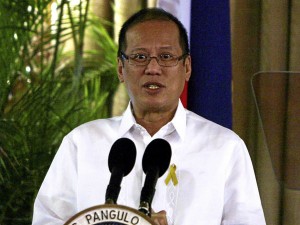MANILA, Philippines—President Aquino on Wednesday defended a Supreme Court ruling upholding a provision in the controversial Cybercrime Prevention Act of 2012 penalizing online libel and brushed aside claims that it infringed on the freedom of expression.
“Will it curtail freedom of expression? I don’t think that’s the objective,” the President said, a day after the high tribunal ruled against a provision giving authorities sweeping powers to shut down websites or record Internet traffic data in real time while affirming its online libel provision.
“You as responsible journalists, you have rights. [But] those rights have their limits, right? We were taught in school that your rights end where they impinge on the rights of others,” Aquino said.
“If there’s something wrong in what is said on TV, radio or in what is reported in newspapers or magazines, then you move to another format, should that be exempted?” he asked.
“Perhaps, you won’t agree,” he told reporters, arguing that such a situation would go against the “equal protection” clause of the Constitution. “If what you’re saying is right, why would you be afraid of that libel issue?”
The President signed the law in September 2012, but its constitutionality was challenged by 15 petitioners.
New arena of fear
Critics fear the government could misuse the law to go after journalists who report on official corruption.
“By extending the reach of the antediluvian libel law into cyberspace, the Supreme Court has suddenly made a once infinite venue for expression into an arena of fear, a hunting ground for the petty and vindictive, the criminal and autocratic,” the National Union of Journalists of the Philippines said in a statement.
Francis Allan Angelo, president of the Iloilo Press Club, said the ruling would have a “chilling effect on journalists” who had been subjected to “whimsical” libel cases and, worse, targeted for assassination.
Opponents have also said the law gives the government sweeping powers to curb Internet freedom due to provisions that impose heavy prison terms for online libel in a country where major protests have been organized through Facebook and Twitter.
At least six senators have filed separate bills seeking to decriminalize libel.
“There should be no libel punishable by imprisonment in our statute books. In modern democracy, if there’s a liability it should only be civil,” said. Sen. Francis Escudero, the author of one bill.
He told reporters he disagreed with calls for the repeal of the cybercrime law, saying this was crucial to curbing cybersex crimes.
Sen. Ferdinand Marcos Jr. likewise pushed for the scrapping of online libel. He said the public should appreciate the difference between a libelous statement in print and broadcast, and one on the Internet.
Sen. Juan Edgardo Angara proposed scrapping the penalty of imprisonment for libel in the Revised Penal Code altogether.
“I think this has been the trend worldwide—to decriminalize libel,” he said. “I don’t think these offenders should be imprisoned.”
Assistant Secretary Geronimo Sy said the Department of Justice was proposing to Congress a new version of the cybercrime law.
Sy said the proposed law would focus, not on libel, which is already sufficiently covered in the penal code, but more on fighting serious online offenses such as child pornography, hacking and “phishing”—trapping people to reveal sensitive information such as bank or credit card accounts.
Archbishop Emeritus Oscar Cruz said the online libel law would not stop him from criticizing and “making fun” of the Aquino administration’s “tuwid na daan” in his blog, www.ovc.blogspot.com.–With reports from Christine O. Avendaño and Nestor P. Burgos Jr., Inquirer Visayas
RELATED STORIES
Aquino: Online libel ruling won’t hinder freedom of expression
DOJ cybercrime office sees no need for law vs Internet libel
Cybercrime law foes unhappy over SC ruling
